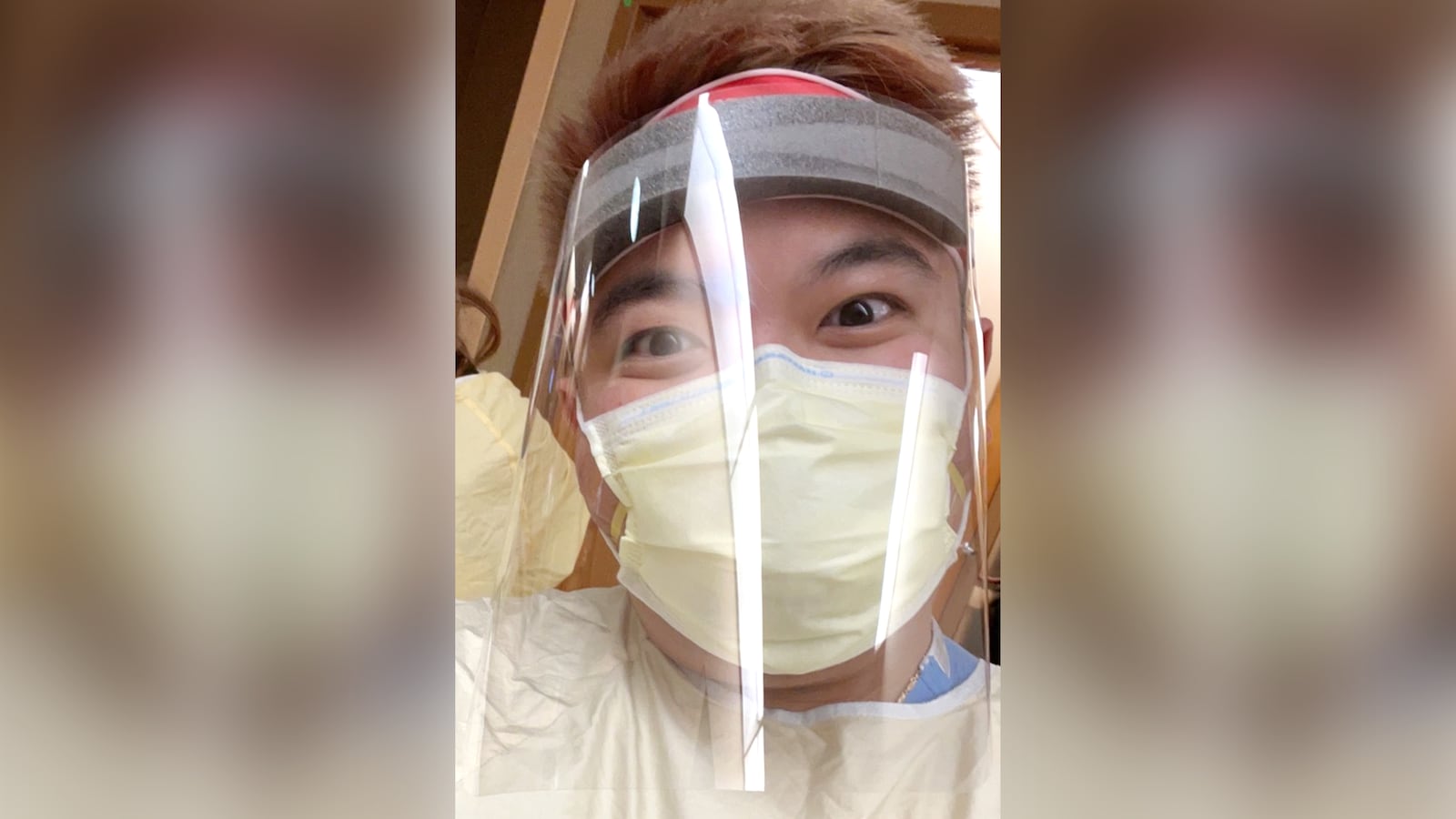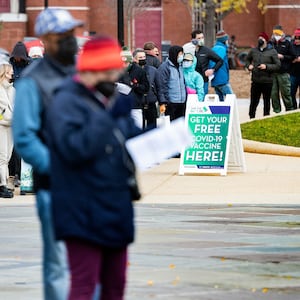For the last month, medical workers across Michigan have slogged toward another holiday season defined by surging COVID-19 cases, an almost surreal descent reminiscent of the pre-vaccine era in which the state emerged as an early pandemic hot spot.
Cases have spiked dramatically and hospitals across the state have been pushed to the brink. Looming mass gatherings, lax mask-mandate practices, and stagnating vaccination rates already had doctors and nurses fearing further chaos.
Then came the threat of the super-mutated Omicron variant, which—early though it may be—experts fear could be even more contagious and possibly even vaccine-resistant than the Delta strain that sent the state’s hospital system into a tailspin this fall.
“I don’t know how much more our hospitals can take,” one Grand Rapids nurse, who asked to remain anonymous for fear of professional retribution, told The Daily Beast on Monday. “We are all already working overtime. The idea of more patients, less resources, and variants could cause more problems? It’s a nightmare.”
The Omicron variant, formally known as B.1.1.529, was classified as a “variant of concern” by the World Health Organization on Friday. The variant, first identified out of southern Africa, has been greeted with travel restrictions across the globe, including the United States imposing a new ban on most visitors from South Africa and seven other African countries. This even as scientists caution we know very little about any unique dangers it may pose beyond that it has dozens of mutations, including some 30-plus on the “spike” protein that helps the virus invade the body.
As of Monday afternoon, perhaps thanks to a notoriously lacking disease-surveillance system in the United States, no cases of the new variant had been identified within Michigan, or any other state. But with cases identified by authorities across the world, including as close to hot-spot Michigan as Ontario, Canada, frontline workers were bracing for the worst.
“The idea of a new variant is just something we can’t wrap our minds around just yet,” Anthony Huynh, a nurse in Lansing, told The Daily Beast.
Even before Omicron emerged, fears of a possible tsunami of cases prompted the federal government to grant Gov. Gretchen Whitmer’s request for staffing assistance, sending over 50 medical professionals to help two hospitals in the state for the next 30 days.
That’s because unlike some states already seeing a surge in cases—and a planet ready to panic at the prospect of a scary new variant—Michigan is already in the red zone.
The daily average of new cases spiked by over 50 percent in the past two weeks, according to The New York Times. The Michigan Health Department on Monday said that more than 84 percent of intensive-care unit beds were full, along with more than 80 percent of total hospital inpatient beds. With hospitalizations increasing steadily over the last 19 weeks, nine Michigan hospitals are now completely full—and another 22 hospitals are at 90 percent capacity.
“Hospitals are at capacity across the state, particularly in Metro Detroit and West Michigan, and this is taking a tremendous toll on our health care workers,” Elizabeth Hertel, Michigan Department of Health and Human Services director, said in a statement.
As ever, state data suggests that a large majority of these hospitalizations are residents who have not gotten the coronavirus vaccine or subsequent booster shot. In the last month, 72 percent of cases and over 70 percent of hospitalizations were among the unvaccinated. Almost 75 percent of deaths in Michigan were also associated with those who had not received a jab.
Experts generally expect vaccines to provide at least some protection against any mutation of the coronavirus, including Omicron. And officials from President Biden to Dr. Anthony Fauci on down are calling for Americans to embrace the measures we know have worked in the past: get vaccines (and boosters), and wear masks.
But in Michigan, relatively weak vaccination rates make the new variant’s emergence all the more disturbing.
“There is a sense that it is more transmissible, but we just don’t know yet,” Dr. Preeti Malani, chief health officer and an infectious-disease professor at the University of Michigan, told The Daily Beast on Monday. “But what we do know is that this could go in a very bad direction.”
For Huynh, a nurse at Sparrow Hospital, the workload is already overwhelming—and the idea of an additional strain imposed by a new variant is virtually “unimaginable.”
The 28-year-old was just a few months into his career as a nurse in the medical oncology unit when the pandemic began, and has been on the frontlines of the deadly pandemic ever since.
Throughout the pandemic, Huynh and his co-workers have subjected themselves to grueling work weeks, volunteered for extra shifts to support one another, and dealt with the reality that less staff means more time in the hospital around COVID.
“I think the fear is that during the holidays, people want to be with their families and forget a pandemic is happening. But without high vaccination numbers, that attitude means that hospitals will see a mass surge of cases and staff will have to work more than ever to keep up with the demand,” Huynh said. “And we don’t even know what the variant will bring.”
Amy Brown, the chief nursing officer at Sparrow Hospital, acknowledged the hardship her staff has endured throughout this pandemic—and said she was terrified about what another variant might mean for a hospital that was already “struggling.” She also noted that the the volume of cases at the hospital continues to climb every week and that the hospital has requested additional help from the Department of Defense.
“I recognize [the staff] are tired and have been doing this for a long time,” Brown told The Daily Beast. “I worry every minute or everyday about the care givers at this hospital. I feel at a loss.”
But Jamie Brown, the president of the Michigan Nurses Association and a nurse herself, echoed the frustration over staffing and general exhaustion, adding that the threat of the new variant has already left hospital staff feeling “demoralized.”
Brown said the union, which currently represents thousands of nurses across the state, has heard from a slew of members about the dire conditions at Sparrow hospital in particular, where workers recently voted to authorize a potential strike. A hospital spokesperson told The Daily Beast that they “dispute all allegations” in a related unfair labor practices complaint laid out by the Michigan Nurses Association.
“We welcome any and all appropriate government help provided it does not serve to undercut a strike that would be seeking immediate and long-term improvements to staffing and safety,” Brown added.
Likewise, for the Grand Rapids nurse, working conditions were “almost as bad as they [were] last year, and I doubt they will get any better anytime soon.”
“Last year, we were able to justify the workload with the knowledge that mass vaccination for COVID would relieve the pressure,” she added. “It’s been almost a year of vaccines, and the pressure is greater than ever.”







